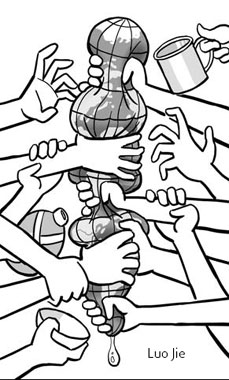Time to act to prevent wars over water
By Gioietta Kuo (China Daily)
Updated: 2008-04-15 07:40
Updated: 2008-04-15 07:40
Just as world oil scarcity is already causing international conflicts, so will the scarcity of water reach a point where wars will break out.
The most blatant example of oil war is the on- going conflict in Iraq. All Iraqis and almost all the people in the world except Republicans in the US believe oil to be the reason for the occupation of Iraq. Even people like Dick Cheney and Karl Rove in their most candid moments admit oil is the driving force. However, the official justification is the ushering in of democracy to the Middle East.
It is a constant source of puzzle for ordinary Americans: do these people really believe it, are they trying to fool us, or just fooling themselves? We shall never know.
The statistics on water are already scary. Already well over 1 billion people suffer from water shortages and 30 countries get more than a third of their water from outside their borders - an obvious source of disputes and instability, especially as the climate changes.
The whole of the sub-Saharan Africa, most of South Asia and western South America are most at risk. The reason: the rapid melting of glaciers due to global warming.

At the meeting of the coalition of 27 International charities last month, Gareth Thomas, minister of International Development of the British government, wrote to prime minister Gordon Brown demanding action to ensure fresh water to 1.1 billion people with poor supplies.
"If we do not act now, the reality is that water supplies may become the subject of international conflict in the years ahead. We need to invest now to prevent us having to pay that price in the future", Thomas said.
The department warned that two-thirds of the world's population will live in water-stressed countries by 2025.
In fact, Brown himself has said pressure on water was one of the factors that could cause instability, state failure or conflict.
The coalition of charities has appealed for a global effort to bring running water to the developing world and supply sanitation to a further 2.6 billion people. It said that international investment is needed now to prevent competition for water to destabilize communities and escalate into conflicts.
Tackling the water and sanitation crisis is essential if the Millennium Development Goal Call to Action is to be a success. Otherwise, progress on health, education, and environment sustainability will be undermined.
Each year 443 million school days are lost globally to diarrhea and 1.8 million children die from these diseases.
In fact, it is often not realized that investing in sanitation and water brings the greatest public health gains, more than any other single development intervention and delivers enormous economic gains. Something G8 would do well to heed. Already, some Asian countries have put tackling these issues at the forefront of their development efforts.
The Millennium Development Goals aim to halve the proportion of people without access to safe drinking water by 2015. To achieve that urgent action needs to be taken.
There is no doubt that climate change is potentially the most important factor affecting water shortage. This, compounded with a growing and increasingly urbanized global population will put pressure on food and water. For a temperature rise of 2 C which is likely to happen by 2050. there would be a catastrophic 2 to 3 billion people suffering from water stress.
The author is senior fellow at American Center for International Policy Studies
(China Daily 04/15/2008 page9)
|
|
|
|